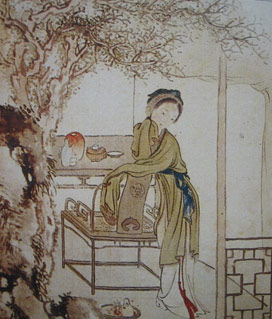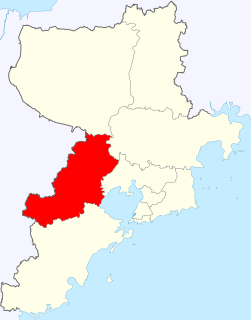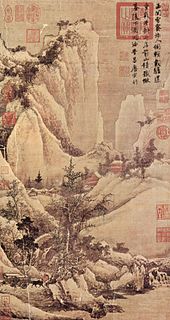
Dream of the Red Chamber, also called The Story of the Stone, composed by Cao Xueqin, is one of China's Four Great Classical Novels. It was written some time in the middle of the 18th century during the Qing dynasty. Long considered a masterpiece of Chinese literature, the novel is generally acknowledged to be the pinnacle of Chinese fiction. "Redology" is the field of study devoted exclusively to this work.
King Gong of Zhou or King Kung of Chou was the sixth king of the Chinese Zhou Dynasty. Estimated dates of his reign are 922-900 BC or 917/15-900.

Liao Hua, courtesy name Yuanjian, originally named Liao Chun, was a military general of the state of Shu Han during the Three Kingdoms period of China.
Meng Po is the Lady of Forgetfulness in Chinese mythology.

Redology is the academic study of Cao Xueqin's Dream of the Red Chamber, one of the Four Great Classical Novels of China. There are numerous researchers in this field; most can be divided into four general groups. The first group are the commentators, such as Zhou Chun, Xu Fengyi, Chen Yupi, and others. The second group is the index group, which mainly includes Wang Mengruan and Cai Yuanpei. The third group are the textual critics, including Hu Shi and Yu Pingbo. The final group are the literary critics, including Zhou Ruchang and Li Xifan.

Wu refers to a region in China whose core area is around Lake Tai in Jiangnan. The Wu region was historically part of the ancient Yang Province in southeastern China. The name "Wu" came from the names of several historical kingdoms based in that area.

King Zhuang of Chu was a monarch of the Zhou Dynasty State of Chu during the Spring and Autumn period in ancient China. His personal name was Xiong Lü, his ancestral name was Mi, and his posthumous title was King Zhuang. He was one of the five rulers dubbed the Five Hegemons by Xunzi and attempted to wrest control of China from King Ding of Zhou.

Zhao County (Zhaoxian), a historic town called Zhaozhou (赵州) in the past, is located in the southwest of Hebei province 40 km (25 mi) southeast of the provincial capital Shijiazhuang, and 280 km (170 mi) south of Beijing. Its total land area is 675 km2 (261 sq mi) and total population is around 550,000. There are many historical sites in Zhao County, including the Zhaozhou (Anji) bridge (赵州桥), Yongtong Bridge (永通桥), Tuoluonijing Tower (陀罗尼经幢), and Bailin Temple (柏林寺). The county is also famous for its agricultural products: snowflake pears, asparagus,and high-quality wheat.

Lujiang County is a county in the south-central part of Anhui Province, People's Republic of China. It is the southernmost county-level division under the jurisdiction of the provincial capital, Hefei. It has a population of 1,200,000 and an area of 2,352 km2 (908 sq mi). The government of Lujiang County is located in Lucheng Town.
Mo Ke is a basketball player who plays center for the Bayi Rockets of the Chinese Basketball Association (CBA).

The Later Zhou was the last in a succession of five dynasties that controlled most of northern China during the Five Dynasties and Ten Kingdoms period, which lasted from 907 to 960 and bridged the gap between the Tang Dynasty and the Song Dynasty.

Zhōu is the Hanyu Pinyin transliteration of the Chinese family name 周, which now ranks as the 10th most common surname in Mainland China, and 71st in South Korea. It has been one of the ten most common surnames in China since the Yuan Dynasty.

Jiaozhou, formerly Jiaoxian or Jiao County, is a county-level city of Qingdao sub-provincial city, Shandong Province, China. It gained its current county-level city designation in 1987. It has an area of 1,313 km2 (507 sq mi) and a population at the 2000 Census of 783,478.

Me is the first studio album by Mandopop boy band Super Junior-M. Me was released in CD stores in selected provinces of China starting April 23, 2008. A Korean version of the album with three bonus Korean tracks was released in South Korea on April 30, 2008. Modified versions of the album were distributed in Taiwan, Hong Kong, Malaysia, Thailand, Japan, and other Asian countries on May 2, 2008.
Dream of the Red Chamber is a 1944 Chinese film directed by Bu Wancang. It is an adaptation of the classic Qing-era novel by Cao Xueqin.

The Four Masters of the Ming dynasty are a traditional grouping in Chinese art history of four famous Chinese painters of the Ming dynasty. The group are Shen Zhou (1427-1509), Wen Zhengming (1470-1559), both of the Wu School, Tang Yin (1470-1523), and Qiu Ying (c.1494-c.1552). They were approximate contemporaries, with Shen Zhou the teacher of Wen Zhengming, while the other two studied with Zhou Chen. Their styles and subject matter were varied.

Datunying Town is a rural town in Ningxiang City, Hunan Province, China. It is surrounded by Huaminglou Town on the north, Daolin Town on the east, and Shaoshan City on the southwest. As of the 2000 census, it had a population of 39,819 and an area of 106.2 square kilometres (41.0 sq mi).

Huaminglou Town is a rural town in Ningxiang City, Hunan Province, China. It is surrounded by Ruyi Township on the west, Donghutang Town on the north, Daolin Town on the eastsouth, Lianhua Town and Yuchangping Town, and Datunying on the south. As of the 2000 census it had a population of 45,634 and an area of 112.4 square kilometres (43.4 sq mi).
Zhou Junchen is a Chinese footballer who currently plays for Shanghai Shenhua in the Chinese Super League.















